Mosquito Biology
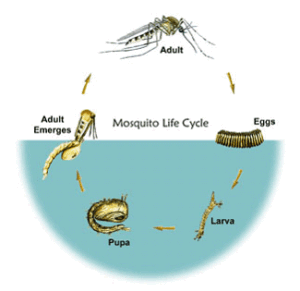 All mosquitoes lay eggs that require water for hatching. Some mosquitoes lay eggs on the inside edges of containers or on the ground in low areas where water will collect and when it does, the eggs hatch. Other mosquitoes lay eggs directly on the surface of water.
All mosquitoes lay eggs that require water for hatching. Some mosquitoes lay eggs on the inside edges of containers or on the ground in low areas where water will collect and when it does, the eggs hatch. Other mosquitoes lay eggs directly on the surface of water.
Once the eggs hatch, a mosquito larva emerges from each egg. The larva goes through four growth stages (called instars) where its skin is shed and a larger larva emerges as it grows. Most larvae have to come to the surface of the water to breath but can travel down through the water to obtain food particles.
From the fourth instar, the mosquito changes into a pupa in which the adult mosquito is developing. At this point the mosquito does not eat but, like the larva, has to come to the surface to breath. When ready, the adult mosquito emerges from the top of the pupal case, rests on the water to harden then after a short time, is ready to fly.
Male mosquitoes often emerge first waiting in a swarm above the water until the females hatch at which point mating takes place. Male mosquitoes feed on nectar and other sources of sugar and female mosquitoes do so also to sustain themselves. Mated females (of most species) seek a blood meal for the development of eggs and when they are mature, the eggs are laid in a suitable location and the life cycle begins again.
MOSQUITO SPECIES FOR EVERY BODY OF WATER
Warren County is host to 45 of the 63 species of mosquitoes found in New Jersey . Different mosquito species require specific habitats and climatic conditions in order to complete their life cycles. The following representative mosquito and habitat types illustrates some of the varied larval habitats that can be found in Warren County.
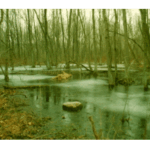
SNOW POOLS
Some mosquito larvae hatch in early spring when snow and ice can still remain. These snowpool mosquitoes usually have only one generation per year and their eggs have to be frozen before they can hatch the next year. The larvae of the snowpool mosquitoes are often slow growing and can take up to 6 to 8 weeks to develop. Aedes stimulans is the primary snowpool mosquito in Warren County.

FLOODWATER
Floodwater mosquitoes are often the primary nuisance mosquitoes in an area. Eggs are laid in moist soils near water. After heavy rains, when the area floods, all the eggs hatch at once. Thousands of larvae undergo the their development in the floodwater unison. A few short days after the initial rainfall, the adult mosquitoes emerge in large broods, ready to look for a blood meal. In Warren County, Aedes vexans eand Aedes trivittatus are the main floodwater species and cause most of the nuisance mosquito complaints.
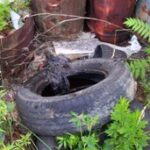
CONTAINERS
Just about any type of container that will hold water can serve as larval mosquito habitat. Unfortunately, there are several mosquito species that prefer to lay their eggs inside of containers; especially tires. This preference for tires has not only afforded a warm, protected shelter for these growing mosquitoes but it has also helped transport them all over the world. Warren County now has several invasive species that have taken up permanent residence in the county. Our newest invader is Aedes albopictus, also known as the Asian tiger mosquito. Tires, gutter extensions, and buckets are among the container habitats where these larvae are often found.
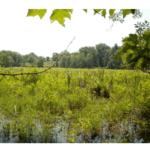
PERMANENT, CLEAN WATER
Anopheles quadrimaculatus is a mosquito that requires permanent/semi-permanent and relatively clean water for larval development. This can be one of the first adult mosquitoes you see in the spring because they overwinter in protected places as adults and come out of hibernation to seek a blood meal to start a new generation. Eggs are laid on permanent bodies of water such as swamps and unused swimming pools.
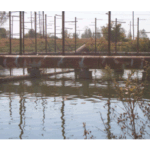
PERMANENT, CLEAN TO POLLUTED WATER
Culex pipiens is another mosquito that overwinters as an adult and begins the next years generation by seeking a permanent/semi permanent body of water to lay eggs on. Culex pipiens typically deposit their eggs on dirty polluted water. Primarily a bird biting mosquito, it is one of the mosquitoes most often associated with the transmission of West Nile virus.
